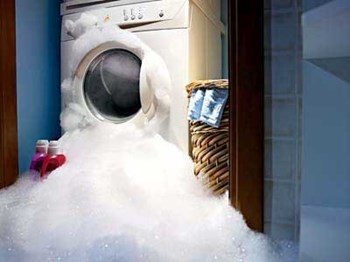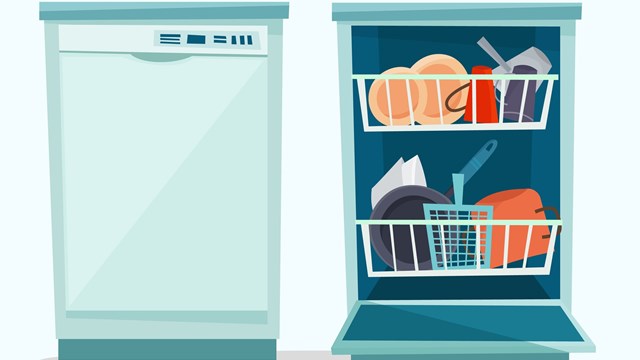
In an online forum, Sharon complains about her upstairs neighbor and begs for advice. Her neighbor had installed a washing machine in her unit, even though there was one already downstairs for the residents of her six-unit building to use. As a result of the neighbor’s improper installation, her appliance overflowed, resulting in a flood of water that came pouring into Sharon’s unit through heating and air vents. Now, Sharon’s wall-to-wall carpeting is ruined and she’s concerned about mold and other damage.
Amenities, Amenities, Amenities
While having certain appliances, such as washing machines, dryers, dishwashers and trash compactors in the units is a very attractive feature for condo or homeowner association residents, these conveniences do occasionally cause leaks, noise and vibration issues between residents, and can also create a major fire risk. There are definitely pros and cons to having in-unit amenities.
“It gives you more access to them when it is more convenient, so it is more personalized access. “If it is in your unit, it is solely for you, so you have greater control over the amenity,” says Stephen DiNocco, AMS, a principal at Affinity Realty & Property Management in Boston. “It gives you more access to them when it is more convenient. On the other hand, if you have the amenities in your unit, then you are responsible for the total cost of installation and maintenance and upkeep and that is the drawback. Let’s say that you have exercise equipment in your house, it is going to take up space and you are going to have to maintain the cost of that. Really, you might only use it for an hour a day. But running down to the clubhouse or fitness center is less cost to yourself.”
Improper installation and misuse of these amenities may also cause damage to the individual unit as well as neighbors’ units.
“Water and mold are huge problems,” says attorney Cameron C. Pease of the law firm of Goldman & Pease in Needham, Massachusetts. “Let's say you're on the third floor and you have a washer that overflows. It doesn’t just affect your unit, it affects the next unit and the units below. Same with mold, it may start with your unit, then grows to common areas and other units. Other issues are noise and cost; some residents might have a loud appliance that is making a racket. And if you have shared utilities and you have one person that is washing clothes all the time, that will run the utility bill,” he says.
That’s exactly what bothered another unit owner. He lives in a condo and explained in an online forum how a broken pipe from a dishwasher installed in the apartment above caused water to flow into his newly-renovated unit. The kitchen was destroyed and there was water damage in almost every room of his home and, he says, in almost every unit under the upstairs unit.
Water and mold damage, if reoccurring, can be detrimental to a building’s insurance policy.
“There are two things that insurance companies hate that are really related to in-unit amenities. One is mold, the other is water, which come from these units. The majority of condos do allow in-unit amenities because people like the benefits of them. People want to have washers and dryers and the restrictions can also have a very negative impact on the marketability of the unit. They don’t have too much effect on the premium unless you end up submitting a lot of mold or water damage claims. That is where it becomes an issue. If you’ve had repeated problems over and over again, then your premiums will go up—or worse, you will have an insurance company that won’t renew,” explains Pease.
To Ban or Not to Ban?
When the cons outweigh the pros, a board of trustees may be inclined to place a ban on certain amenities in order to better protect the property. But appliances will always come with some sort of a problem, and Pease says that the board should carefully consider their options before they decide to ban certain amenities.
“Before a board goes to ban one of these, they should really think long and hard about it. It would seriously affect the marketability of a unit. I know a lot of people wouldn’t buy because they want a washer and dryer.” That being said, Pease advises that should boards decide to ban certain amenities, they make amendments through the bylaws and not the rules and regulations.
“If they do decide to ban them, a lot of times boards will try to do it with a rule and regulation as opposed to changing it in the bylaws. In my experience, one of these bans would have to be through the bylaws because it regulates the interior of the unit as opposed to a common area. However, a bylaw is more difficult to enact because usually it needs 75% of unit owner approval as opposed to a board adopting a rule and regulation which just needs a majority.”
In addition, Pease recommends that the owners who already have the amenities are accommodated. “What I’ve seen before is that if a board really wants to pass one of these, the best advice is for the board to include a grandfather clause for existing unit owners. Let’s say you are in a condo and you have three people who already have washer/dryers so you provide that they can have them if they own the unit,” he explains.
Even if the ban is successfully adopted, who is going to police it?
Managers contend that it’s up to the building staff to keep a close eye on maintenance issues and make sure nothing is awry.
Pease adds that boards can choose to fine residents who do not comply with the changes.
Coming to a Compromise
Banning amenities may lead to legal headaches and community disagreement on how to proceed.
DiNocco says that a better approach would be to establish certain parameters for installation, restricting the types of amenities that can be installed. For example, a board may only allow energy-efficient washers and dryers to be installed.
Pease agrees, adding that boards will be more successful in avoiding the common problems encountered with in-unit amenities ( such as water and mold) if they regulate what types of amenities are installed and who can maintain them.
“If you start banning people for things they already have been doing, they are much more likely to challenge it in court. Instead of an outright ban, [boards] can try to address it through certain rules and regulations. If water overflow is a problem, they can put in certain rules and regulations that they will only let licensed plumbers put in the washers or require the new water efficient machines that can run on 10 gallons of water in a rinse cycle; or some require residents to use low-suds detergents so they don’t clog the drain pipes. An interesting one that I’ve seen recently is boards allowing washers but requiring them to sit on an overflow pan, which if it overflows, will shut off the washer.”
Prevention is Key
Communicating with residents about keeping appliances in top working condition is also imperative to preventing any damage. Make sure residents don’t try to fix appliances on their own. “I've seen times where problems arise where the residents try to fix the dishwasher by yanking it out of the wall, which can breach the gas pipe in the back of the appliance. When they call [the utility company], they come in and can shut the whole building down. One such time it happened, the building spent around $125,000 making construction changes to get the building back on again,” says Ken Lovett, president of John B. Lovett & Associates, Ltd., a New York-based management firm.
When communicating with your residents, Lovett also says to be sure to spell out in any renovation agreement what is allowed and not allowed to be installed on the remodel.
“Also, if a building is going to consider letting residents add dishwashers or washing machines in their unit, they should also check the building infrastructure to make sure it’s not problematic,” he says.






Leave a Comment